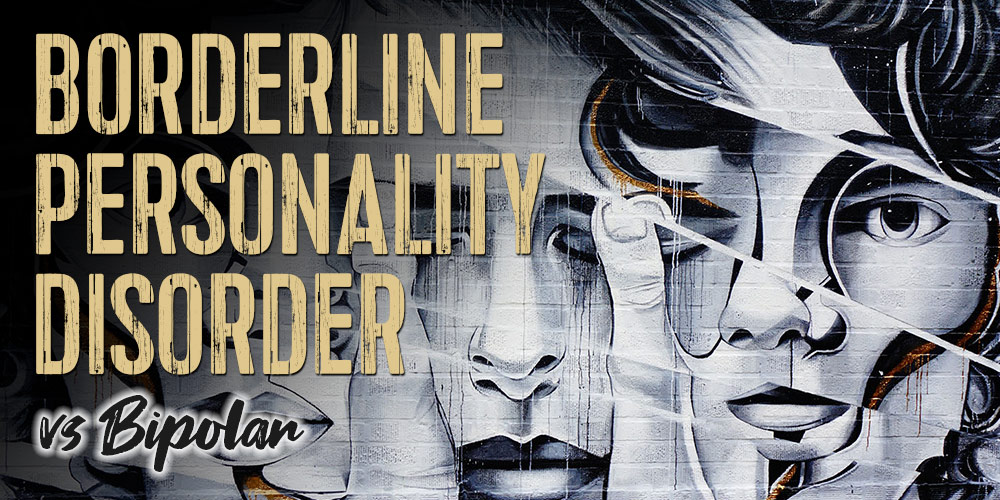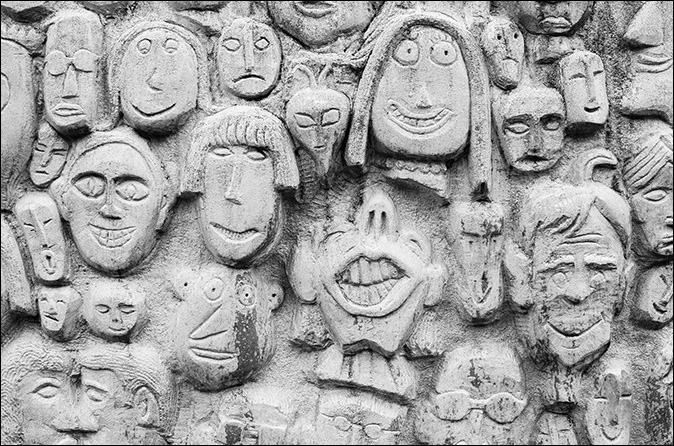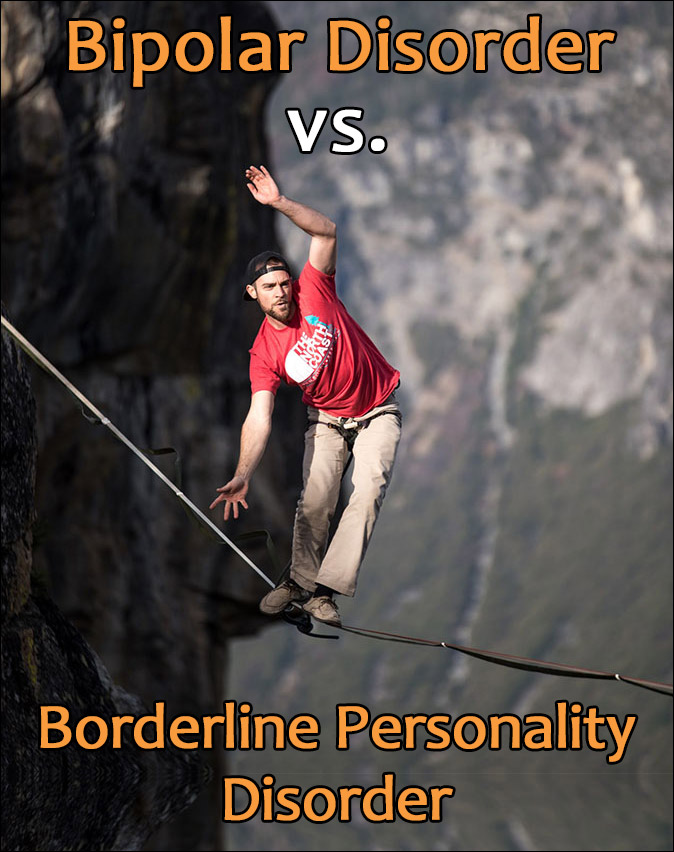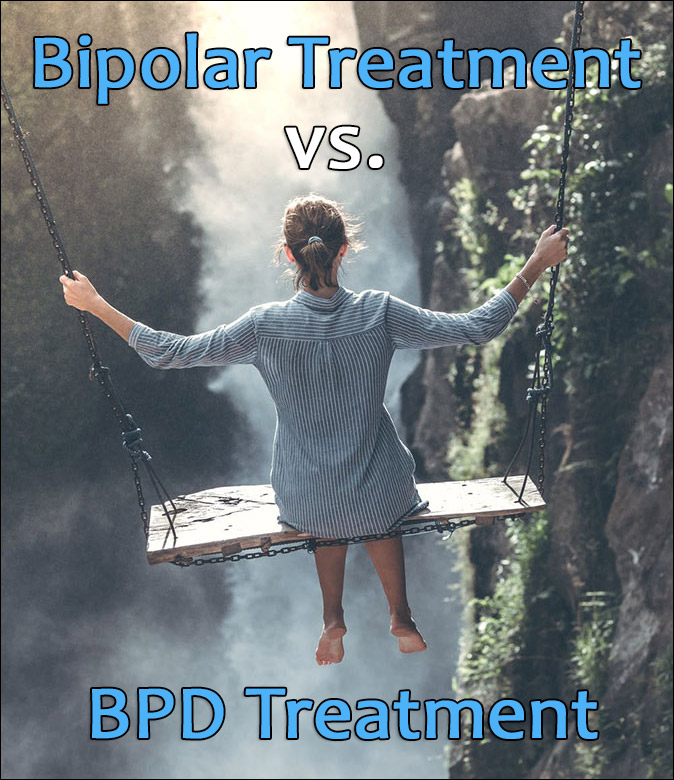
Understanding and distinguishing the differences between Borderline Personality Disorder vs Bipolar Disorder can be difficult because they share many related symptoms.
Both of these mental health conditions can cause depression, drive impulsive behavior, and create extravagant or unwarranted emotional responses in people living with either of the disorders.
To answer the common question, “is BPD worse than bipolar,” it’s necessary to first understand the difference between these two conditions.
BPD vs Bipolar
Borderline Personality Disorder (BPD) is classified as one of 10 personality disorder types in the Cluster B category.
As Mayo Clinic describes it, BPD is associated with rigid, unhealthy patterns of thinking, behavior, and functioning that make relating to people and situations problematic for a person.

People with BPD struggle with mood, behavior, and a constantly changing self-image that affects the ways in which they relate to and understand others.
This can create significant impairment in school, a professional career, relationships, and social settings.
The National Institute of Mental Health (NIH) estimates that in the United States nearly 1.5 percent of the population struggles with borderline personality disorder.
Symptoms of Borderline Personality Disorder
Because of the instability related to behavior, mood, and self-image, people living with personality disorders generally struggle with maintaining meaningful and productive interpersonal relationships.
The Symptoms of Borderline Personality Disorder include:
- Self-destructive behaviors such as reckless driving
- Impulsively spending large amounts of money
- Self-harming issues like cutting or burning
- Drug or alcohol misuse, dependence, or addiction
- Suicidal thoughts or ideations
- Confusion about one’s place in the world
- Tendency to have a “black or white” view of events, along with habitually shifting interests and values in their own life
- Intense, sometimes volatile relationships with family and friends who they may hate in one moment and cherish in the next
- Periods of severe depression or anxiety
- Chronic feelings of loneliness and a fear of being alone
It’s important to note that intense stress or emotions can trigger many of these symptoms, even when these situations may appear normal or somewhat minor to others.
The severity and number of symptoms an individual with Borderline Personality Disorder experiences will also vary from person to person.

Bipolar vs BPD
Unlike BPD, which is a personality disorder, Bipolar Disorder (BD) is a mood disorder. This condition is characterized by a distorted emotional state that can range from crippling depression to extended periods of mania.
Bipolar disorder is also more common than borderline personality disorder.
An estimated 2.8 percent of population copes with bipolar disorder, with around 83 percent of these cases considered severe, according to the National Alliance on Mental Illness (NAMI).
The disruption in a person’s mood can range from severe depression to acute mania or psychosis. These different emotional episodes can last as little as a few days to several months.
In between these episodes, a person with bipolar can also feel stable and productive.
Two Main Classifications of Bipolar Disorder
Although there are several types of bipolar disorder, the two main ones are Bipolar I and II.
Bipolar I is a diagnosis in which a person is on the extreme end of mania, experiencing highs that impair sleep for days on end and may lead to psychosis and hospitalization.
Those diagnosed with Bipolar II are more apt to suffer serious depression.
One interesting aspect of this mental health condition is that it has been linked to people who are highly creative.
In fact, there are a number of famous people with bipolar disorder who have been very open about their experiences with the condition and have discussed how treatment helped them lead healthy lives.
There are also some excellent bipolar movies that depict what it is like living with the disorder.
Symptoms of Bipolar Disorder
Though people with bipolar disorder can be stable in between mood swings, the extreme emotional shifts can alternate between serious depression and intense mania.
Symptoms of Bipolar Induced Depression include:
- Feelings of guilt, worthlessness, and hopelessness
- Long periods of sadness or crying spells
- Intense worry, fear, or anxiety
- Feeling irritable, agitated, or angry
- Chronically exhausted
- Cycles of unexplained body aches and pains
- Difficulty concentrating or feeling indifferent about everything
- Inability to find pleasure in activities and people normally enjoyed, known as anhedonia symptoms
- Isolating from friends, family, work, or other social connections
- Thoughts about death and suicide
- Dependence to drugs or alcohol
Symptoms of Bipolar Mania can include:
- An overblown sense of confidence and optimism
- Severely elevated mood despite a serious lack of sleep
- Racing speech or thoughts
- Impulsive or risky behavior
- Grandiose sense of self
- Irritability, anger, and aggression
- During psychotic episodes, hallucinations and delusions can be present
Obviously, individuals living with Bipolar I or Bipolar II will experience symptoms and episodes unique to their own circumstances.
In general, however, episodes of depression can last two weeks or longer while manic episodes may last up to a week, sometimes requiring hospitalization.

Difference Between Bipolar vs Borderline Personality Treatment
A diagnosis of borderline personality disorder vs bipolar must be made by a qualified mental health professional. They will assess a patient based on recent episodes, family medical history, and several other factors, including the presence and severity of specific symptoms.
Borderline Personality Disorder Treatment
In the case of BPD vs bipolar, there is not a Food and Drug Administration (FDA) approved medication for the treatment of borderline personality disorder.
However, some medications, such as antidepressants or anti-anxiety drugs, may be prescribed to treat some of the symptoms.
Other treatment approaches include one-on-one counseling and group therapy.
Treatment methods like Cognitive Behavioral Therapy (CBT) or Dialectical Behavior Therapy (DBT) are also useful in helping patients with BPD express themselves and communicate with family and friends.
Bipolar Disorder Treatment
For bipolar disorder, mood-stabilizing medications can help level out extreme swings in a person’s emotional state. Antipsychotic or anticonvulsant medications might also be prescribed.
Managing the symptoms of bipolar disorder is completely achievable through a mix of medication, counseling, symptom awareness, and a healthy lifestyle that includes exercise, nutrition, and avoiding alcohol or drug use.
Both bipolar disorder and borderline personality disorder are challenging mental health conditions to live with. Left untreated, both disorders will continue to worsen. However, proper treatment can improve the symptoms of both conditions.
For those who have used alcohol or drugs to self-medicate the symptoms on their own and developed a dependence or addiction, dual diagnosis treatment may be necessary to overcome both the addiction and mental health issues together.
When considering borderline vs bipolar as mental health conditions, there is no way to discern if BPD is worse than bipolar or vice versa.
Each disorder will affect every individual differently, and it’s crucial to seek proper medical treatment to effectively manage the symptoms so they do not spiral out of control.
Related Posts
- 23 Movies About Bipolar Disorder
Movies about bipolar disorder are popular because it is a mental health condition that impacts…
- Addictive Personality Disorder
The last decade has seen an increase in reported cases of substance abuse. Behavioral addictions…
- Obsessive Compulsive Personality Disorder / OCD
The term Obsessive Compulsive Disorder / OCD is often used casually in conversation, however, it’s a…
